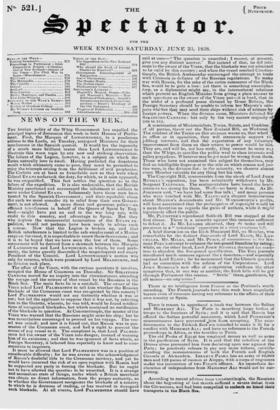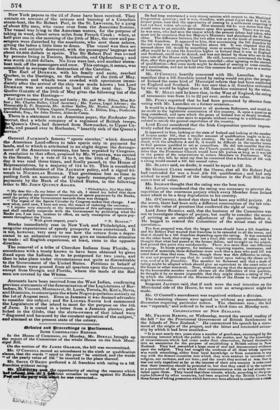According to recent advices trim Constantinople, the Russians about the
beginning of last month suffered a severe defeat from the Circassians, and had been compelled to embark on board their transports in the Black Sea. New York papers to the 2d of June have been received. They contain an account of the seizure and burning of a Canadian steam-boat, the Sir Robert Peel, in the St. Lawrence, by a gang of about fifty men, who came over from the American frontier. The vessel was lying in the American waters, for the purpose of taking in wood, about seven miles from French Creek ; when, at halt past one in the morning of the 29th of May, the crew and pas- sengers were disturbed by the assailants, who sent them ashore, giving the ladies a little time to dress. The vessel was then set on fire, and entirely destroyed, with the passengers' baggage and about 60,000 dollars in specie. The Sir Robert Peel was owned by persons living in Toronto, Brooksville, and Ogdensburg ; and was worth 50,000 dollars. No lives were lost, and another steam- boat took off the passengers and crew. This outrage, it seems, was committed to revenge the destruction of the Caroline.
The Earl of DURHAM, with his family and suite, reached
Quebec, in the Hastings, on the afternoon of the 28th of May. he streets and wharfs were crowded with spectators imme- diately after the arrival of the ship was made known ; but Lord DURHAM was not expected to land till the next day. The Quebec Gazette of the 29th of May gives the following list of the passengers in the Hastings— Earl and Countess of Durham and family ; Mr. and Mrs. Ellice, Miss Bal- four; Mr. Charles Huller, Chief Secretary ; Mr. Turton, Legal Adviser ; the Honourable E. P. Bouverie, Mr. Arthur Buller, Mr. Bushe, Attach6s; Ho. nonrable Frederick Villiers, Captain Pousonby, C. A. Dillon, Esq., Frederick Cavendish, Esq., Sir John Doratt, Aides-de-Camp.
There is a statement in an American paper, the Rochester De- al, that a whole company of a regiment of British troops, Queen's Own, had deserted from Newmarket, in Upper Ca- a, and passed over to Rochester, "heartily sick of the Queen's rvice."



























 Previous page
Previous page